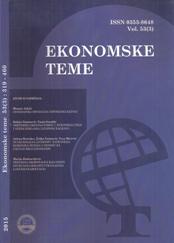Economic Themes (2015) 53 (3) 4, 353-374
Jelena Birovljev, Željko Vojinović, Vera Mirović
Abstract: When and how will one country take care of its workers who are left due to their injury, illness, death or old age without ability to care for their existence, and who contributed most of their life as tax payers. The role of the social system is just that. Social systems of intergenerational solidarity operate for decades in all European countries, regardless of their political and economic structure and level of development. Number of employees within a pension system is dependent on many factors, but it is also independent compared to the category of pensioners and possibilities of functioning of the pension system. The total number of beneficiaries directly derived from the number of employees in some earlier period, while the possibility of pension payments vary depending on the current number of workers. Some categories may behave differently in relation to the total number of employed in an economic system, but the functioning of the pension system is depending on this indicator. In Serbia, for years the number of deaths exceeded the number of births, large-scale migration of citizens, the progress of medical science as a factor of increased life expectancy of people, higher rates of unemployment, longer years of service until retirement and some other less significant factors influenced the disproportion in the number of employees in relation to the number of pensioners. This resulted in a very poor state of the pension system and caused the question of its future functioning. A social problem is getting more difficult to resolve, in quality and quantitative terms, because its main source of inflow of funds is in constant decline while expenditures are increased.
Keywords: pension system; employees; users; insurance; function
FUNCTIONAL DEPENDENCE OF PENSION USER CATEGORIES IN RELATION TO THE TOTAL NUMBER OF THE EMPLOYED
Jelena Birovljev, Željko Vojinović, Vera Mirović
Abstract: When and how will one country take care of its workers who are left due to their injury, illness, death or old age without ability to care for their existence, and who contributed most of their life as tax payers. The role of the social system is just that. Social systems of intergenerational solidarity operate for decades in all European countries, regardless of their political and economic structure and level of development. Number of employees within a pension system is dependent on many factors, but it is also independent compared to the category of pensioners and possibilities of functioning of the pension system. The total number of beneficiaries directly derived from the number of employees in some earlier period, while the possibility of pension payments vary depending on the current number of workers. Some categories may behave differently in relation to the total number of employed in an economic system, but the functioning of the pension system is depending on this indicator. In Serbia, for years the number of deaths exceeded the number of births, large-scale migration of citizens, the progress of medical science as a factor of increased life expectancy of people, higher rates of unemployment, longer years of service until retirement and some other less significant factors influenced the disproportion in the number of employees in relation to the number of pensioners. This resulted in a very poor state of the pension system and caused the question of its future functioning. A social problem is getting more difficult to resolve, in quality and quantitative terms, because its main source of inflow of funds is in constant decline while expenditures are increased.
Keywords: pension system; employees; users; insurance; function

